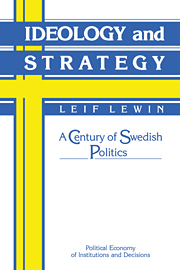Book contents
- Frontmatter
- Contents
- List of tables
- Series editors' preface
- Author's preface
- 1 The problem of rationality
- 2 Tariffs
- 3 Suffrage
- 4 Parliamentarism
- 5 The crisis agreement
- 6 Economic planning
- 7 The supplementary pension system
- 8 Nuclear power
- 9 Employee investment funds
- 10 Strategic action in politics
- Appendix
- Index
8 - Nuclear power
Published online by Cambridge University Press: 29 September 2009
- Frontmatter
- Contents
- List of tables
- Series editors' preface
- Author's preface
- 1 The problem of rationality
- 2 Tariffs
- 3 Suffrage
- 4 Parliamentarism
- 5 The crisis agreement
- 6 Economic planning
- 7 The supplementary pension system
- 8 Nuclear power
- 9 Employee investment funds
- 10 Strategic action in politics
- Appendix
- Index
Summary
MARCHING INTO THE NUCLEAR POWER SOCIETY
Government–business cooperation and the economic boom both continued. The Social Democratic party, which dominated the Swedish state, established increasingly intimate ties with the business sector, especially with major companies. Under the leadership of Tage Erlander and banker-industrialist Marcus Wallenberg, the Swedish economy experienced a golden age that made the Swedish living standard the highest in the world during the 1960s. The chairman of the Swedish Trade Union Confederation and the director of the Swedish Employers' Confederation toured the United States together and gave speeches about “the Swedish Model,” which involved centralized collective bargaining agreements and a labor–management relationship marked by cooperation and consensus. The Social Democrats supported a liberal economic policy aimed at furthering growth, accelerating the restructuring process, stimulating expansive economic forces, and facilitating the mobility of labor from low-wage companies threatened with bankruptcy to the most profitable economic sectors. Industrial profits and employee pay climbed at a record pace. In such a flourishing economic climate, no one seemed to benefit from conflict; it appeared as if continued consensus was to everyone's advantage.
In the end, however, growth itself came to be questioned. Progress had its price. It led to the so-called moving van policy – government-sponsored training and incentives to relocate from economically depressed areas to those with labor shortages – which was viewed somewhat less favorably by those who were subjected to it than by those who had devised it.
- Type
- Chapter
- Information
- Ideology and StrategyA Century of Swedish Politics, pp. 238 - 273Publisher: Cambridge University PressPrint publication year: 1989

